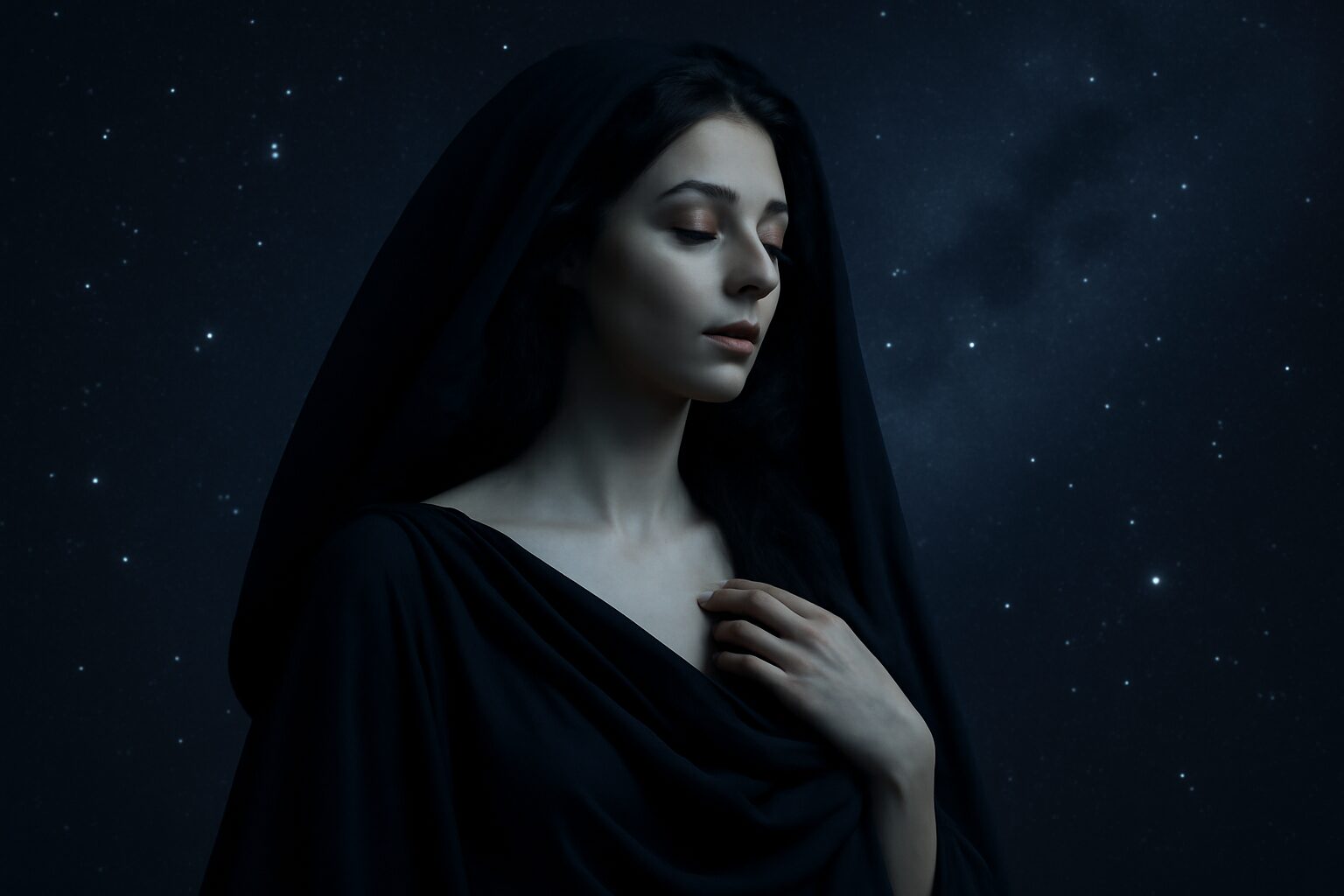Nyx: The Primordial Goddess of Night
In the vast pantheon of Greek mythology, Nyx stands as one of the most ancient and powerful deities. As the primordial goddess of night, she existed at the very beginning of creation, emerging from Chaos alongside other elemental forces like Gaia (Earth) and Tartarus (the Abyss). Unlike many Olympian gods, Nyx was a shadowy, enigmatic figure—both feared and revered for her unfathomable power.
Mythology and Origins
According to Hesiod's Theogony, Nyx was born from Chaos, making her one of the first beings in existence. She was the mother of many significant deities, often giving birth to personifications of abstract concepts. Among her children were Hypnos (Sleep), Thanatos (Death), Nemesis (Retribution), and the Moirai (Fates). Some myths even suggest that Nyx mothered the Oneiroi (Dreams) and Eris (Strife), highlighting her influence over both the natural and supernatural worlds.
Powers and Influence
Nyx wielded immense power, capable of enveloping the world in darkness with a mere wave of her hand. Even Zeus, the king of the gods, was said to fear her. In Homer's Iliad, she is described as a force so formidable that Zeus himself hesitated to cross her. Her dominion over night extended beyond mere absence of light—she represented the mysteries, dangers, and hidden truths that thrived under her veil.
Nyx was often depicted as a shadowy figure, sometimes riding a chariot pulled by dark horses or wrapped in a star-studded cloak. Unlike many deities, she had no major temples or widespread cults, yet her presence was felt in every dusk and dawn, a reminder of the cyclical nature of time.
Relationships and Significance
Though Nyx was often solitary, she was sometimes paired with Erebus, the god of darkness, with whom she bore Aether (Light) and Hemera (Day). This paradoxical union—darkness giving birth to light—symbolized the balance of opposing forces in the cosmos.
Nyx's significance lies in her role as a primordial force, embodying the inevitability of night and the unknown. Unlike later Olympian gods, she was not anthropomorphized with human flaws or desires; instead, she remained an elemental, almost abstract presence. Her legacy endures as a symbol of the mysteries that lie beyond human understanding, a reminder that even the gods must yield to the natural order.
Alternative Names for Nyx
God Name: Nox (Roman)
Nox is the Roman equivalent of the Greek goddess Nyx. Both deities personify the night and share similar mythological roles, though Roman mythology often assimilated Greek gods under different names.
God Name: Erebos (Greek)
While not an alternative name for Nyx, Erebos (or Erebus) is closely associated with her as her consort. Erebos represents darkness and shadows, often paired with Nyx in myths to symbolize the primordial night.
God Name: Nyx Aetheria (Greek)
An epithet sometimes used to describe Nyx in her connection to the upper air (Aether). This highlights her role in the cosmos, bridging night and the celestial realms.
God Name: Nyx Erebia (Greek)
Another epithet linking Nyx to Erebos (darkness), emphasizing her association with the deep, shadowy aspects of night.
Tales about Nyx
Nyx and Hypnos: The Gift of Dreams
In the silent depths of night, Nyx watched over her son Hypnos, the embodiment of sleep. She saw how mortals tossed and turned, their minds restless even in slumber. Moved by compassion, she whispered to Hypnos, "My child, grant them more than oblivion. Give them visions to soothe their weary souls."
Hypnos, inspired by his mother's wisdom, wove threads of dreams from the fabric of night itself. He crafted gentle fantasies, prophetic glimpses, and healing reveries. Nyx enveloped these dreams in her dark cloak, carrying them to sleeping mortals. From that night on, humanity found solace and inspiration in their dreams, a eternal gift from the primordial night.
Nyx and Erebus: The Primordial Union
Before the dawn of time, NyxErebus, the personification of darkness, existed as complementary forces in the void. Their union represented the perfect balance of night and shadow, creating the fundamental duality of existence.
From their cosmic embrace sprang forth numerous divine children, including Thanatos (Death) and Hemera (Day). This primordial partnership established the natural cycle of day and night, darkness and light, that would govern the cosmos forever. Their eternal dance continues each evening as night follows day, a testament to the first divine union.
Frequently Asked Questions
Who is Nyx in Greek mythology?
Nyx is the primordial goddess of night in Greek mythology. She is one of the first deities to emerge at the creation of the universe, representing the very essence of night itself.
Why is Nyx important in Greek mythology?
Nyx is important because she is one of the primordial deities, meaning she existed from the beginning of time. She represents fundamental aspects of the universe (night) and is the mother of many other significant gods and spirits like Hypnos (Sleep) and Thanatos (Death).
What powers does Nyx have?
Nyx has control over night and darkness. She is described as extremely powerful, even feared by Zeus. Some myths suggest she can bring sleep, dreams, or even death through her children.
How is Nyx different from other night deities?
Unlike later gods associated with night (like Artemis or Hecate), Nyx isn't just connected to night - she IS night itself. As a primordial deity, she's more of a cosmic force than a personality-driven Olympian god.
Are there any modern references to Nyx?
Yes! Nyx appears in modern culture through video games (like Hades), books, and astronomy (one of Pluto's moons is named Nyx). Her concept also influences how we think about night as a natural force.













